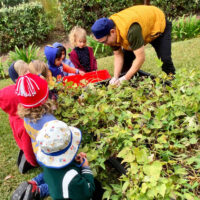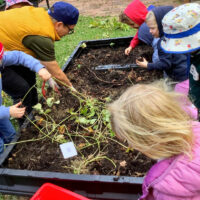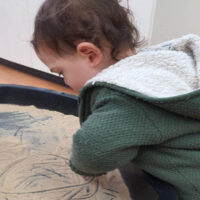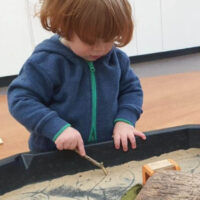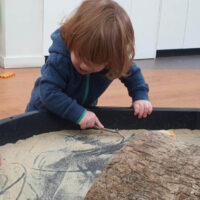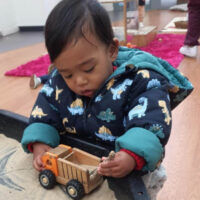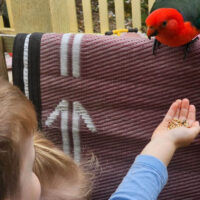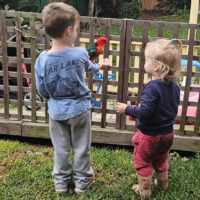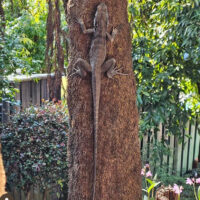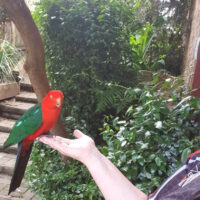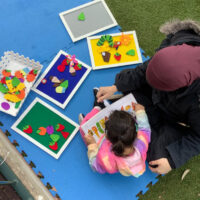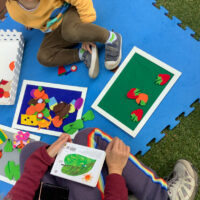Johnson House
Waratah Room
Story by Educator Sarah
Our wonderful Chef, Charoen has heard about the great work the children in Johnson House Waratah room have been doing creating their own vegetable and herb garden and cooking delicious meals. Charoen invited the children to join him in harvesting the sweet potatoes from our kitchen garden, where fresh produce is grown to help prepare children’s daily meals.
The children carefully followed Charoen’s instructions for harvesting the potatoes. They first pulled out the branches that were covering the potatoes, and then started to dig deep to collect them. There were many discussions about the colour, size and length of the potatoes. We counted them and noticed their weight as we pulled them out. It took such enthusiasm and strength to pull the potatoes out of the dirt! This was a fantastic opportunity to continue building our knowledge of sustainability and caring for and giving back to the land. It was also an opportunity for the children to learn about how food is produced, sourced and the processed.
The children were so proud of themselves as they helped carry the produce crate for Charoen. They even invited him to come and cook with us one day in Johnson House. As we made our way back to the centre, there was much excitement and anticipation about cooking the potatoes and some vegetable chips.
We took turns to chop up the potatoes and I added them to hot oil and the children listened to the chips cooked away. Then the fun began as the children eating and sharing the sweet potato chips, as we all as sharing their adventures with other peers and educators.
Murray House
Wattle Room
Story by Educator Tripti
Over the past few weeks, the children in Murray House Wattle room have been working on their mark making skills, and this week they gathered around a specially set up table to explore mark making in sand.
They used their fingers, hands and twigs to create lines and circles in the sand, and they have also been practising drawing shapes and lines, which helps to develop their pre-writing skills. The children also practiced naming the shapes they were creating, for example saying, “circle” as they made circles in the sand. Other children engaged with the mark making materials in different ways, for example, loading and unloading twigs into a toy dump truck on the table. Later they brushed their hands over the sand and created hand marks on the table.
Exposing children to mark making through play and exploration builds on their inquisitive natures and promotes their interest in drawing and writing. The children in Murray House love to explore how they can manipulate resources to create different outcomes and effects. We will continue to use a wide range of resources to develop our mark making skills.
Family Day Care Sydney Wide
The Cubby House Family Day Care on Darug and Gundungurra Land, Winmalee, Lower Blue Mountains
Story by Educator Support Officer Alix
Family Day Care Sydney Wide is very proud to support educator, Tracy Roberts. Her advocacy and commitment to promoting sustainability throughout her service while also supporting children and young people to connect with and contribute to their world has been essential in providing a foundation for them to become active, responsible citizens, for now and in the future.
Residing in an area surrounded by native wildlife and scenic landscapes, it is easy to see why protecting Country is embedded into Tracy’s service philosophy. This is interconnected and deepened through her Aboriginal heritage and spirituality as a proud Wiradjuri woman.
The new Sustainability Principle added to version two of the Early Years Learning Framework has been so evident throughout her educational program that it seemed only fitting to share how she embeds the three interwoven dimensions of sustainability (environmental, social, economic) into children’s everyday learning and routines.
Tracy shared, ‘Our Cubby House garden is getting lots of visitors now that our beautiful natives are in full bloom. We’ve had King Parrots, Bowerbirds, Grey Butcherbirds and Rainbow Lorikeets (also known as ‘Stickybeak Sids’, from the Lynley Dodd story ‘Slinky Malinki Open the Door’), and we have had so much fun taking part in the Great Australian Bird Count.
We also have our resident Eastern Water Dragon we call Lenny. Although wild, Lenny often greets the Cubby House families as they arrive, and he isn’t bothered by them.
The Cubby House kids are all respectful of our visiting wildlife and are careful with our gardens.
Over the next few weeks, we will be practising our ‘snake sightings’ to ensure we are all safe should a slithering visitor travel to our garden.‘
Community Playgroups
Story by Playgroup Coordinator Rebecca
Words are everywhere in our world.
Words tell us where we are going, what’s coming up ahead or what might be happening around us. Without words, and the ability to read and understand those words, our lives are filled with confusion and misunderstandings, we don’t know what is going on and it can be very difficult to navigate the world in which we live.
One way to set our children up for success in their lives is to help give them the knowledge and understanding of words. We can do this by reading to our children on a regular basis and involving them in everyday conversations and activities that include reading. For example, using a recipe to cook, making a shopping list, and reading street signs are some ways you can help your child to understand that words and letters have meaning.
Very often when we read a known and well-loved story with our children they will ‘read’ along with us. This helps your them to develop their knowledge of sounds, words and language, promotes thei brain development and their ability to focus and concentrate and helps to spark their imagination ad curiosity.
Reading to and with your child has benefits for parents and caregivers as well. The time that you spend reading and sharing stories together helps to promote bonding and builds your relationship with your child.
At playgroup there are always books available to read with your child. You are welcome to take a book home with you, share it with your child, and return it on your next playgroup visit.
In these photographs you can see how we have used felt boards and a book for families to share and read together. Linking words, pictures and stories together helps your child to understand that words have meaning, and this knowledge and ability can help set your child up for future success.
